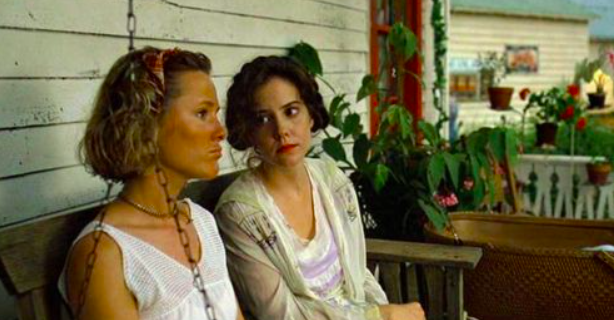
When people think about Fried Green Tomatoes, the 1991 film adapted from Fannie Flagg’s beloved novel, one relationship rises above all others: the bond between Idgie Threadgoode and Ruth Jamison. Their story is more than just a subplot — it’s the heartbeat of the film, pulsing with loyalty, defiance, and a love that refuses to be defined by convention.
Idgie Threadgoode: A Spirit Untamed
From the moment Mary Stuart Masterson steps onto the screen as Idgie, audiences are introduced to a character who doesn’t play by the rules. Short-haired, rebellious, and fearless, Idgie is the kind of person who will drink, gamble, or climb into a bee hive if it means proving a point. She’s fiercely protective of the people she loves, and she refuses to bow to the expectations of small-town Alabama.
But beneath her bravado lies something softer — an unspoken vulnerability that becomes clearest in her relationship with Ruth. Idgie is tough to the world, but with Ruth, she is tender, almost fragile. It’s in their scenes together that Idgie’s wild heart reveals its true compass.
Ruth Jamison: Grace and Quiet Strength
Mary-Louise Parker’s Ruth Jamison is everything Idgie is not. Ruth is poised, gentle, deeply rooted in tradition and faith. She arrives in Whistle Stop with the aura of a proper Southern lady, but her life is marked by hardship and survival.
Her marriage to the abusive Frank Bennett shows her resilience, but it also sets the stage for Idgie’s unwavering loyalty. While Ruth seems fragile on the outside, her strength grows throughout the film. By the time she and Idgie are running the Whistle Stop Café together, Ruth has shed her role as the victim and stepped fully into her own power — all while maintaining her quiet grace.
A Love That Defied Labels

At the core of Fried Green Tomatoes is the relationship between Idgie and Ruth — a bond that many viewers read as a deep, unspoken romance. Hollywood in the early ’90s stopped short of explicitly labeling their connection as romantic, but the subtext was impossible to ignore.
They built a life together, raising Ruth’s son Buddy Jr., running the café, and protecting each other through trials that would have broken lesser bonds. In an era and place where same-sex love was rarely acknowledged, their story was radical in its quietness. Instead of dramatic declarations, their love is shown through everyday acts of devotion: the way Idgie rushes to Ruth’s aid, the way Ruth looks at Idgie with unwavering trust, the way they build a home side by side.
The Whistle Stop Café: Their Shared Haven
The Whistle Stop Café is more than a restaurant in the story — it’s a symbol of Idgie and Ruth’s life together. Within its walls, they create not just meals but community, warmth, and belonging. It’s a safe space where outsiders are welcomed, laughter is shared, and loyalty is tested.
The café becomes the backdrop for their legacy, a physical embodiment of their partnership. To this day, fans who visit Juliette, Georgia, where the café scenes were filmed, often speak of the palpable spirit of Idgie and Ruth lingering in the air.
Why Their Story Endures
Three decades later, Idgie and Ruth’s story continues to touch audiences because it transcends time and setting. At its core, it’s about love in its purest form: selfless, loyal, and resilient.
They remind us that true love doesn’t always need a label, nor does it require validation from the outside world. Sometimes it exists quietly, in stolen glances, in shared struggles, and in the simple act of building a life together against all odds.
For viewers who grew up watching Fried Green Tomatoes, Idgie and Ruth weren’t just characters — they were an affirmation that love comes in many forms, and that sometimes the most radical act is to simply stand by the person you love, no matter what.
